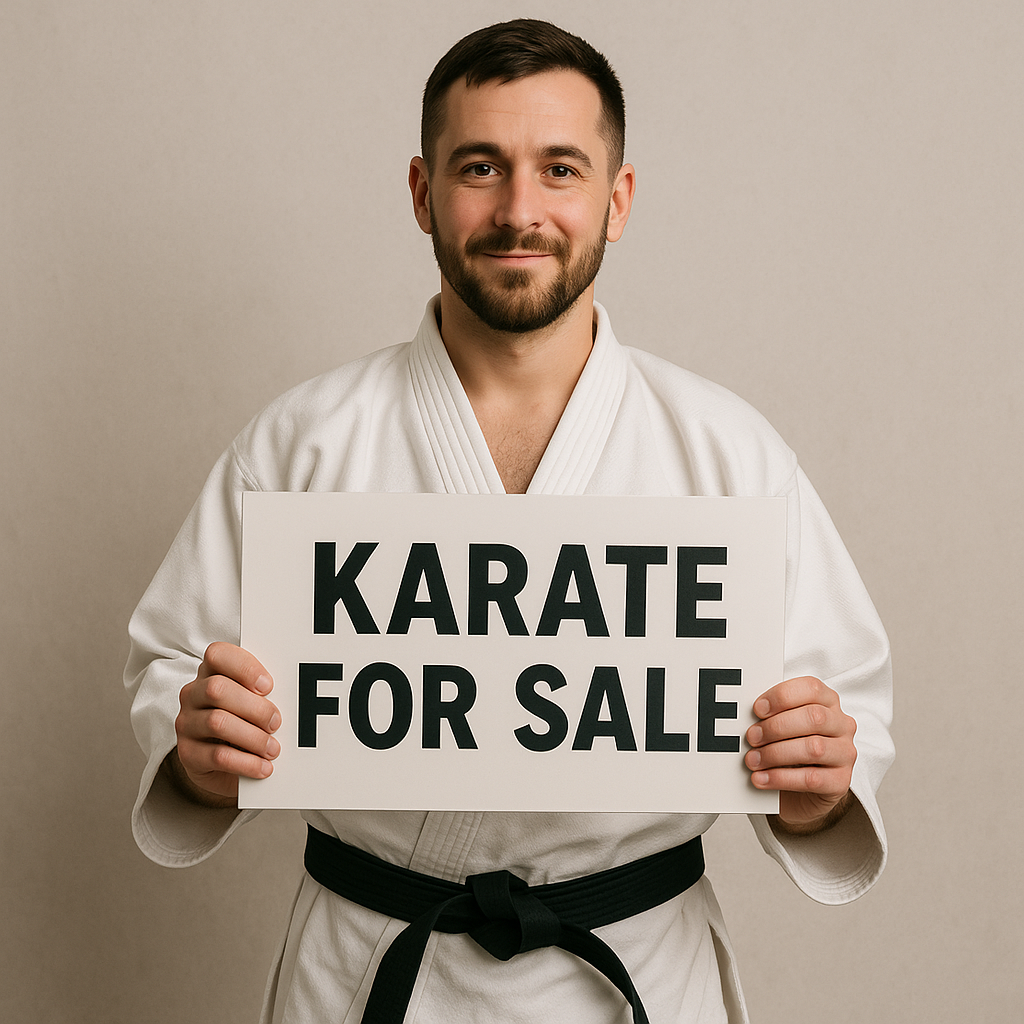
Black Belts for Sale? How the Business of Karate Is Undermining the Art of Karate
“When karate becomes a product on a shelf instead of a path on the mat, something sacred gets lost in translation.”
When the Dojo Turns Into a Dollar Sign
Think of traditional karate like a centuries-old oak tree — deeply rooted, time-tested, and unshakably strong. But now, that same tree is being hacked down and polished into cheap furniture for quick sale. The result? Karate that looks the part but lacks the heart.
In this blog, we’ll break down how the commercialization of karate is diluting its soul. From belt factories to trophy-chasing dojos, we’ll explore what’s going wrong, why it matters, and how real martial artists can fight back.
The Rise of “McDojos”: Fast Food Karate
The term McDojo refers to schools that prioritize profits over principles. These places promise quick promotions, hand out belts like candy, and teach watered-down techniques to keep customers (not students) happy. Their goal isn’t mastery — it’s membership retention.
When evaluating a dojo, ask how long it typically takes to earn a black belt. If they say “a couple of years,” consider it a red flag.
A traditional karate black belt takes 4–6 years of rigorous training. Many commercial schools advertise black belts in 12–18 months.
“A black belt is just a piece of cloth. The person wearing it is what matters.” – Rickson Gracie
Belts Over Basics: Paying for Progress
If your karate journey looks more like a shopping cart than a spiritual path, something’s gone sideways.
Many modern dojos have adopted a “pay-to-play” model — frequent testing fees, expensive uniforms, and mandatory gear purchases. Promotions are often based more on payments than performance, leading to inflated egos and hollow skills.
Look for instructors who emphasize quality over quantity and test only when students are truly ready — not when their billing cycle says it’s time.
Some schools charge up to $75–$150 per low level belt test and Black Belt testing fee I have seen as high as $2000, not including equipment or seminar fees.
“Karate begins and ends with courtesy — not commerce.” – Gichin Funakoshi
Trophies Before Tradition: The Sportification of Karate
Karate wasn’t created for points — it was forged in discipline and self-defense.
As karate has moved into the realm of competitive sport, flashy moves and point scoring have taken center stage. While tournaments can be valuable, overemphasis on competition strips karate of its deeper purpose: personal growth, humility, and real-world application.
Balance is key. Choose a dojo that teaches both traditional kata and kata based sparring, and doesn’t treat trophies as the ultimate goal.
68% of karate students in commercial schools prioritize competitions over character development.
“In the old days, you trained to survive — not to win medals.” – Shihan Keiji Tomiyama
The Vanishing Sensei: From Mentor to Manager
Once, a sensei was a mentor, friend and teacher. Now, too often, they're a brand ambassador.
Traditional karate sensei were lifelong practitioners who embodied the values they taught. Today, many instructors are more focused on Instagram followers, merch lines, and cross-promotions than actual instruction. The sacred bond between student and teacher is fading fast.
Seek out instructors who train alongside their students and continue their own martial journey — not just run the business.
This is a scary stat and I was shocked when I was doing my research. Only 1 in 5 karate instructors in the U.S. actively continues their own training past black belt level.
“A true sensei is still a student.” – Mas Oyama
Losing the “Do” in Karate-Do
Karate-do means “the way of the empty hand” — not “the way to a direct debit.”
The "Do" (道) in karate-do reflects a lifelong path — of patience, discipline, and self-discovery. But commercial pressures are turning that path into a revolving door of promotions, merchandise, and shallow wins. The deeper life lessons? Left behind in the dust.
“The ultimate aim of karate lies not in victory or defeat, but in the perfection of character.” – Gichin Funakoshi
Fighting for the Soul of Karate
Karate isn’t a product — it’s a practice. And right now, that practice is being endangered by a growing obsession with profit, prestige, and promotions. But all is not lost. True martial arts will survive, as long as students and teachers choose integrity over income, values over vanity, and growth over gimmicks.
So if you're a student, seek a dojo that challenges you to be better, not just richer in belts. And if you're an instructor, remember: you're not just selling classes — you're shaping lives.
In the end, karate is not about fighting others — it’s about mastering yourself. Don’t let the business of it defeat the spirit of it.
Matt Gallagher, Renshi